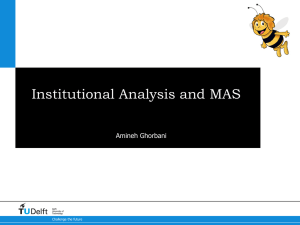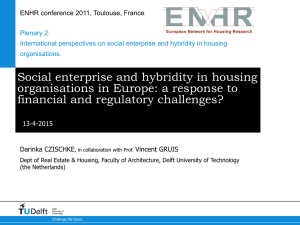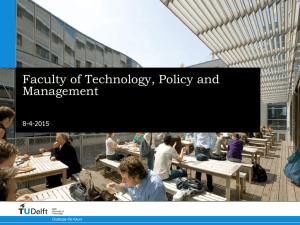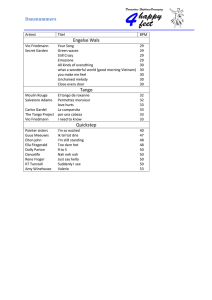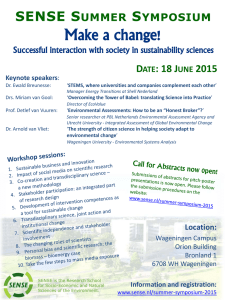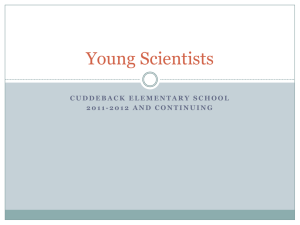Titel van de presentatie
advertisement
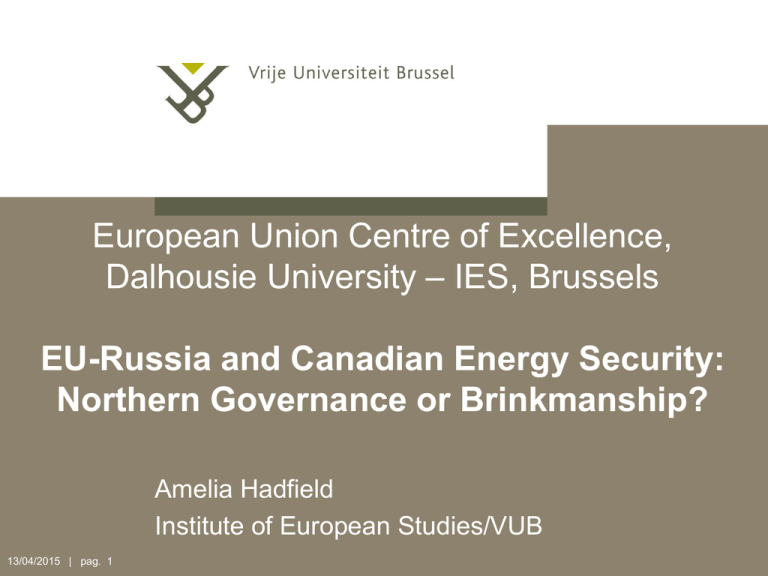
European Union Centre of Excellence, Dalhousie University – IES, Brussels EU-Russia and Canadian Energy Security: Northern Governance or Brinkmanship? Amelia Hadfield Institute of European Studies/VUB 13/04/2015 | pag. 1 In the pipeline… • Energy security & foreign policy • How to build your own energy market: EU • How to run your own regional energy monopoly: Russia • The Arctic: New ‘Great Game’ or Northern Governance? Titel van de presentatie 13/04/2015 | pag. 2 1. EU: Multiple Actors • European Commission: the ‘competence’ to make policy Competition, Internal Market, and Climate Change • Member States (operating within the EU Council): retain competence in ALL other areas including negotiating with foreign suppliers like Gazprom • National energy companies (NOC/NECs) (EdF, Gaz de France) • Private energy companies Titel van de presentatie 13/04/2015 | pag. 3 Key Energy Security Questions for the EU • Subsidiarity Issue: who is the best policy actor to take forward investment in energy, the safeguarding of energy security? • An EU actor to promote Union-level solutions, or individual Member States promoting national solutions? • Public solutions via law or market solutions via competition? Titel van de presentatie 13/04/2015 | pag. 4 2. EU overview • World’s largest integrated trading block • 479 million people; 27 Member States • Operates on the basis of ‘rolling treaties’ and core institutions • EU as a unit: 3rd largest energy consumer in the world (after US & China) • BUT: little European ‘indigenous’ energy sources • An importer (except Netherlands & UK) Titel van de presentatie 13/04/2015 | pag. 5 3. EU Energy Profile Is the EU an autonomous energy actor? Can it make its own “EU energy policy”? •Yes: It has a 3-part energy policy based on competitiveness, security of supply and sustainability. •Yes: It has its own legal framework, or ‘acquis’ connected to Compeition Policy, and the Internal Market which affects HOW MS regulate, sell, protect and use their energy supplies (form). •No: The Member States still have sovereign power to determine the source of their imports, destination of exports and type of energy mix (content). Titel van de presentatie 13/04/2015 | pag. 6 EU Energy Policy 1. Competitiveness A completed Internal Energy Market based on transparency, non-discrimination, third-party access, cross-border transmission. Universal electricity for all; and independent regulators. 2. Sustainability 20% of EU energy used by 2020 or 30% by 2030 must come from energy efficiency, or renewables. 3. Security of Supply Oil stocks of 90 days Diversification via enhanced supplier relationships (Russia, Norway, North Africa) EU-owned pipelines, gas hubs in central Europe, poss. more LNG terminals, set up Energy Correspondents networks for gas and oil supply, stocks. The EU internal energy market • Rests implicitly on open competition, which means breaking apart all energy monopolies, so that energy suppliers should not dominate EU distribution networks • The European Commission wants to enforce the EU's single energy market laws "as a matter of priority", • How? EU Legislation (series of Directives to be adopted by all EU MS), completed by 2014 • Centerpiece: Third Energy Package… Titel van de presentatie 13/04/2015 | pag. 8 EU Third Energy Package • Gathering together all the updated EU Energy Directives (Gas, Electricity) to stimulate competition / eradicate dominant or monopolistic suppliers) completed by 2014 • Chiefly: the requirement on Unbundling: picking apart vertically integrated companies (uncoupling upstream & downstream; and breaking apart monopolies, within, and supplying to EU) Titel van de presentatie 13/04/2015 | pag. 9 EU Good cop, bad cop • Good cop: Commission as regulatory watchdog: Phasing out regulated prices, analyzing the proper & improper use of subsidies by various EU MS, and acting to protect vulnerable customers. • Bad Cop: The Commission is pursuing infringement procedures against MS that have not transposed the Third Energy Package directives yet or have failed to do so correctly.” This could lead to cases at the European Court of Justice and heavy fines. Titel van de presentatie 13/04/2015 | pag. 10 Enforcing the Third EU Package • Caused outright anger amongst European dominant gas suppliers and Gazprom of Russia. • Energy Commissioner Günther Oettinger: “Russia must abide by the EU's internal market rules and stop offering widely varying prices.” • Followed by: investigation into suspected anticompetitive market practices by Gazprom. • Possibly overhauling current contracts… Titel van de presentatie 13/04/2015 | pag. 11 Glass Houses? • The EU is not currently on track to meet that 2014 deadline to fully implement the Third Energy Package, and cannot complete its internal energy market. • In seven Member States, more than 80% of the power generation is still controlled by the historic supplier, and not open enough to new suppliers, or flexible in terms of pricing. Titel van de presentatie 13/04/2015 | pag. 12 Defining Energy Security • ‘The assurance of the ability to access the energy resources required for the continued development of national power and adequate infrastructure to deliver these supplies to market’ (Kalicki and Goldwyn, 2005). • Importer states: security of supply = consistent delivery of affordable energy sources. • Exporter states: security of demand = access to a developed and reliable market for the long-term sale of energy products. Titel van de presentatie 13/04/2015 | pag. 13 Real Problem • Energy security: a public good which is not properly valued by the market and the benefits of which are available equally to those who pay for it, and to those who do not. • Energy security = integral to modern society, but prone to market failure, political manipulation and underdistribution. Titel van de presentatie 13/04/2015 | pag. 14 Energy in Current EU Foreign Policy • EU-Russia Energy Dialogue (10 years in 2010) • European Neighbourhood Policy/ Eastern Partnership (Ukraine, Georgia, Azerbaijan) • Euro-Mediterranean Partnership (EMP-ENP tension incorporates Algeria, Egypt, Libya*, Syria*) • Energy Community Treaty (Balkans & Ukraine as observer) • EU-Africa Strategic Partnership (Sub-Saharan Africa) • Central Asian Strategic Plans Energy in Future EUFP • Nabucco gas pipeline (from Caspian to Austria) • Stronger dialogue with OPEC, GCC, IEA & G8 • Baltic Interconnection Plan, Southern gas corridor, Liquefied natural gas, Mediterranean energy ring, North-South interconnections within Central and South-East Europe, North Sea offshore grid • EU-US Strategic Partnership • EU Arctic Policy (2008 draft), no territorial toehold, but a policy ‘steward’ 16 Commission’s New Role? 7 September 2011: ‘The EU Energy Policy: Engaging with Partners Beyond our Borders’ MS must share info on all their energy agreements with third countries, amongst themselves & the Commission Commission ‘may provide an opinion on the conformity of these agreements with EU law and EU security of supply objectives’ If mandated by the Council, the Commission could negotiate key energy agreements (at EU level, to achieve EU core objectives) e.g. with Russia, Azerbaijan and Turkmenistan Titel van de presentatie 13/04/2015 | pag. 17 2011 EU Energy Policy • ‘It doesn’t mean that the Commission is going to be at the negotiating table in all negotiations; or review all existing agreements… that would be overlybureaucratic.’ • It will offer advice, legal opinions on a case-by-case basis, in scenarios that could affect security of supply, or hinder competition. Titel van de presentatie 13/04/2015 | pag. 18 2011 EU Energy Policy • An enormous step forward? Or source of legal and regulatory confusion & stasis? • Concretizes the role of energy security within European foreign policy. • May provide the EU with a new capacity to actually deal with its own energy security problems via suppliers, not merely market mechanisms. Titel van de presentatie 13/04/2015 | pag. 19 EU-Russia Decent Economic Ties • Russia: EU’s third most important trading partner in goods (after the US and China), with 87 billion EUR in exports to Russia. The EU is thus by far the largest market for Russian goods. • But Russia is 4th (after US, China, Switzerland) for the EU, with 6.4% of all EU exports and 158 billion EUR in imports in 2010. • 2010: imports and exports rose by 32 % compared after having been hit by the global economic crisis. Russia’s total account surplus rose by 47% compared to 2009 and reached $ 79 billion in 2010. Titel van de presentatie 13/04/2015 | pag. 20 Ideal energy relations? "The overall objective of the energy partnership is to enhance the energy security of the European continent by binding Russia and the EU into a closer relationship in which all issues of mutual concern in the energy sector can be addressed while, at the same time, ensuring that the policies of opening and integrating energy markets are pursued. With the strong mutual dependency and common interest in the energy sector, this is clearly a key area of EU-Russia relations". (European Commission, 2011) Titel van de presentatie 13/04/2015 | pag. 21 Unlikely… “If the EU continues to push, continues to threaten Gazprom with unbundling directives, continues to insult the sovereign interests of Russia, insists on backward economic structures and unenforceable legal attitudes, or undermines bilateral trade relations with European partner states, Gazprom can easily find ways to ensure that energy diversification takes on a swift and permanent eastern dimension.” S. Lavrov, Russian Foreign Minister, 2012. Titel van de presentatie 13/04/2015 | pag. 22 Comrades or competitors? DAL-IES 13/04/2015 | pag. 23 Source: European Commission – Eurostat Link: http://ec.europa.eu/energy/international/russia/doc/20120329_pl_presentation_ep_eu_russia-clean.pdf Total EU-27 Imports of Gas by Country of Origin (2010) Titel van de presentatie 13/04/2015 | pag. 24 Total EU-27 Imports of Crude Oil by Country of Origin, 2010 Titel van de presentatie 13/04/2015 | pag. 25 Romania United Kingdom Poland Sweden Slovenia France Hungary Energy Dependency per Member State - All Products, 2011 (%) Germany Slovakia Belgium Portugal Ireland Luxembourg EU-27 -50 0 50 Energy Dependency 100 Result? EU vs. Russia EU: Security of Supply Russia: Security of Demand Open energy market State-managed/owned market Seeking to buy from Africa, Caspian, possibly Iran Seeking to buy from Africa, buy more cheaply from Caspian, to sell to Asia Gas spats are of Russia’s making Gas spats are caused by Ukraine Cut its reliance on Russian imports Increase the reliance on European consumers Demand-side reduction Cheap gas outweighs EE savings 4:1 Can offer long-term FDI to underwrite pipeline modernization Is interested in long-term contracts to bankroll further distribution, not capacity Significant trade advantage over Russia Significant energy supply advantage over EU Lisbon Solidarity Clause Titel van de presentatie 13/04/2015 | pag. 27 Has successful EU MS bilaterals Outcome: Politicized Energy Security • Fuel-based definitions (gas security vs. oil etc) • Geopolitical “US vs. THEM” paradigm – Importer states: security of supply = consistent delivery of affordable energy sources. – Exporter states: security of demand = access to a developed and reliable market for the long-term sale of energy products. Missing: how to equitably provide available, affordable, reliable, efficient, environmentally benign, properly governed and socially acceptable energy services . ,……………………….. Titel van de presentatie 13/04/2015 | pag. 28 Perennial Russian Ambitions EU’s main gas & oil supplier Main export route for energy producers in Central Asia (Kazakhstan, Turkmenistan, Uzbekistan) and Northern and Central Europe (Nord & Southstream pipelines) •A prime supplier for future customers in Asia •A new investor in Africa •A strategic partner, not a ‘political customer’ of the EU Titel van de presentatie 13/04/2015 | pag. 29 Drives… Promiscuous Bilateralism Germany + Russia = NORDSTREAM 8 Nov 2011: The first of Nord Stream's twin pipelines in operation, starting the flow of gas from Nord Stream into the European gas grid, in Lubmin Germany. • Nord Stream’s five shareholders: Gazprom, BASF/Wintershall, E.ON Ruhrgas, Nederlandse Gasunie and GDF SUEZ • Promiscuous bilateralism? Diplomatically recognized, but has regionally zero sum side effects. Titel van de presentatie 13/04/2015 | pag. 30 Austria Belgium Bulgaria Cyprus Czech Republic Denmark Germany Estonia Finland France Greece Hungary Ireland Italy Latvia Lithuania Luxembourg Malta Netherlands Poland Portugal Romania Slovenia Slovakia Spain Sweden United Kingdom Crude Oil Imports from Russia per Member State, 2009 (share in EU-27 total) 25 20 15 10 5 0 Natural Gas Imports from Russia per Member State, 2009 (share in EU-27 total) Titel van de presentatie 13/04/2015 | pag. 32 Russia-Europe Pipelines Overview Russian Natural Gas Pipelines Source: U.S. Energy Information Administration, Country Analysis Briefs. March 2005. Druzbha Gas Pipeline Titel van de presentatie 13/04/2015 | pag. 35 Current Russian Pipelines • Northern Lights: transits Belarus • Soyuz & Brotherhood: transit Ukraine • Yamal Europe & Druzbha: transit Poland Russia’s “anti-transit” options: • Gas spats (reliably unpredictable) • New partners, new routes (predictable if sometimes unreliable) Titel van de presentatie 13/04/2015 | pag. 36 “If ‘we’ build it”…. “We consider it our common objective to upgrade and diversify our energy infrastructure. You know that we have completed the Nord Stream gas pipeline system under the Baltic Sea. We have launched another pipeline project that will run under the Black Sea, the South Stream. All this, along with the use of Ukraine’s gas transportation system and expansion of the Yamal-Europe gas pipeline system, will significantly increase energy security on the European continent.” - Russian President V. Putin, EU-Russia Summit (Dec 2012) Titel van de presentatie 13/04/2015 | pag. 37 “then we can sell it….” “President Putin, Gazprom and Russia have only one topic on their agenda: to sell as much gas as our neighbours need. There is after all only a limited number of countries producing gas.” Alexander Medvedev, Director General of Gazprom Export, 2012 Titel van de presentatie 13/04/2015 | pag. 38 1. Nordstream Pipeline: Russia-Germany (2011) Titel van de presentatie 13/04/2015 | pag. 39 2. Southstream Pipeline: Russia – Bulgaria, Serbia, Hungary, Slovenia, Austria Titel van de presentatie 13/04/2015 | pag. 40 3. Bluestream Pipeline: Russia – Turkey Titel van de presentatie 13/04/2015 | pag. 41 EU energy weaponry? Massive Caspian gas & oil drawn from the port of Baku, crossing eastern Europe / Balkans without transitting Russia.. The Shah Deniz shareholders (SOCAR/Azeri state oil company + Statoil, BP and Total) in Azerbaijan Currently choosing between two ‘corridors’: Trans Adriatic Pipeline (TAP) and Nabucco West Pipeline Titel van de presentatie 13/04/2015 | pag. 42 Nabucco (not just an Italian opera) Titel van de presentatie 13/04/2015 | pag. 43 Trans-Adriatic Pipeline (Black Sea-Italy) Titel van de presentatie 13/04/2015 | pag. 44 Not a done deal… • Gazprom involvement in precisely the same Member States as its own pipelines • Gazprom stakes in key parts of both consortia • Negative spin: more ‘divide and rule’ by Gazprom • Positive spin: genuine attempt at ‘coownership’ (Big-3/Iran?) Titel van de presentatie 13/04/2015 | pag. 45 A shale revolution? • Dieter Helm and other, consultant to Energy Commissioner Oettinger, the shale evangelists • Shale: possibly ‘super-abundant’ in Poland, Hungary, Romania, Bulgaria • Switching from coal to shale gas will “halve the EU’s CO2 emissions overnight” • As conventional shale IMPORTS decline, Europe will, and can rely on “potential indigenous shale gas exploitation” Titel van de presentatie 13/04/2015 | pag. 46 Or false promises? • Vicious ‘anti-shale’ public diplomacy in Poland • Geologically challenging: deep extraction, hydraulic fracturing (high pressure benzene), possible methane release post-fracking • If safe, still unregulated • Exit route: possibly subsidise wind and solar (Denmark); remain agnostic on nuclear? Titel van de presentatie 13/04/2015 | pag. 47 The Arctic… • A peaceful High North = Iceland using extra-territorial policies to participate in international operations (climate change research & peacekeeping); • A securitized High North = needs a minimum operational capacity like its NATO allies; should increase its cross-border regional monitoring for shipping • A busy High North = more ships passing through Icelandic waters; higher risk of accidents, detrimental to fishing industry. Emergency response capabilities are vital. Titel van de presentatie 13/04/2015 | pag. 48 The Arctic: New Great Game or Northern Governance? • Key themes – New access (US Geological Survey 2008) – vs. preservation – Regulated via governance vs. national interests/territorial claims • Key players – Arctic Circle 8: Sweden, Finland, Iceland + – High Arctic 5 Russia, Canada, US, Norway and Denmark (Greenland) – Arctic Council Titel van de presentatie 13/04/2015 | pag. 49 Titel van de presentatie 13/04/2015 | pag. 50 Canada’s “use it or lose it” Arctic Policy “Canada takes responsibility for environmental protection and enforcement in our Arctic waters… we will demonstrate stewardship on behalf of our country, and indeed, all of humanity.” (Tuktoyaktuk, NWT 2008) “In exercising our sovereignty...we are not only fulfilling our duty to the people who called this northern frontier home, and to the generations that will follow; we are also being faithful to all who came before us….” (Inuvik, NWT 2008) Titel van de presentatie 13/04/2015 | pag. 51 1 Polaris + 2 CF 18s (+ ice breaker & dinghy) = Operation Nanook 10 Titel van de presentatie 13/04/2015 | pag. 52 Canada’s (rather better) Arctic Foreign Policy: 2012 Canada’s Arctic foreign policy provides the international platform from which to project our national interests in the world across all four pillars of the Northern Strategy: -exercising our sovereignty, - promoting economic and social development, - protecting the Arctic environment, and - improving and devolving governance. We will pursue our interests at the international level through leadership and stewardship. http://www.international.gc.ca/polar-polaire/canada_arctic_foreign_policy-brochure-la_politique_etrangere_du_canada_pour_arctique.aspx?lang=eng&view=d Titel van de presentatie 13/04/2015 | pag. 53 Russian Arctic Claims “The Arctic is undeniably, legally, territorially and culturally Russian. It has been since time immemorial.” •President Vladimir Putin (2012) “For the Russian economy there are no alternatives for the majority of resources extracted in the North,” These resources provide Russia’s strategic security and will be a determining factor in lifting and modernizing its economy.” •Deputy Secretary of Russia’s Security Council, Yevgeny Lukyanov (2011) Titel van de presentatie 13/04/2015 | pag. 54 2007: Russian expedition to the Arctic seabed Titel van de presentatie 13/04/2015 | pag. 55 2008: to the North Pole…. Titel van de presentatie 13/04/2015 | pag. 56 2009 Putin’s “who needs gloves” Arctic expedition Titel van de presentatie 13/04/2015 | pag. 57 US Arctic Policy (2009) ”The Northwest Passage is a strait used for international navigation… the regime of transit passage applies to passage through those straits. Preserving American rights and duties relating to navigation and overflight in the Arctic region supports our ability to exercise these rights throughout the world, including through strategic straits. The U.S. is prepared to operate either independently or in conjunction with other states to safeguard these interests.” Titel van de presentatie 13/04/2015 | pag. 58 EU Arctic Policy 2013: pure rhetoric “The Arctic is an area of growing strategic importance. The European Union has an important role to play in supporting the successful Arctic co-operation and in helping to meet the challenges that now confront the region… with three (and with Iceland potentially four) Arctic Council states amongst its members. The EU is also a major destination of resources and goods from the Arctic region. Many of its policies and regulations therefore have implications for Arctic stakeholders.” (EEAS) Titel van de presentatie 13/04/2015 | pag. 59 EU Arctic Policy 2013 (rather better) • Research on the Arctic environment (determining the EU’s ‘Arctic footprint’) • Fighting climate change (20% GHG reduction by 2020) • Investing in sustainable investment (€1.14 billion for social, economic & envtl dev’t) • Monitoring changes (€200 million, international research activities) • Shipping and maritime safety (EU competence; 90% of its trade is ship-based) Titel van de presentatie 13/04/2015 | pag. 60 Arctic Governance Redux • US to sign UN Convention on Law of the Seas • Russia to agree with UNCLOS territorial demarcation principles • All subsequent arguments to be settled (including the Northwest Passage)… • Only sovereign states remain in the Arctic Council • ‘the 8’, plus….China? • The Arctic Council becomes the defender of an Arctic Treaty • Absorbing all previous biodiversity conventions, with new regulations to cover shipping, hydrocarbon exploration… Titel van de presentatie 13/04/2015 | pag. 61 Last: redefine energy security itself ! Energy Security Dimension Components 1. Availability Security of supply; security of production; dependency and diversification 2. Affordability Price stability; access and equity; decentralization; low prices 3. Technology Development Innovation and research; safety and reliability; resilience; energy efficiency; investment 4. Sound Regulation Governance; trade; competition; knowledge 5. Sustainability Land use; water; climate change; air pollution Titel van de presentatie 13/04/2015 | pag. 62
